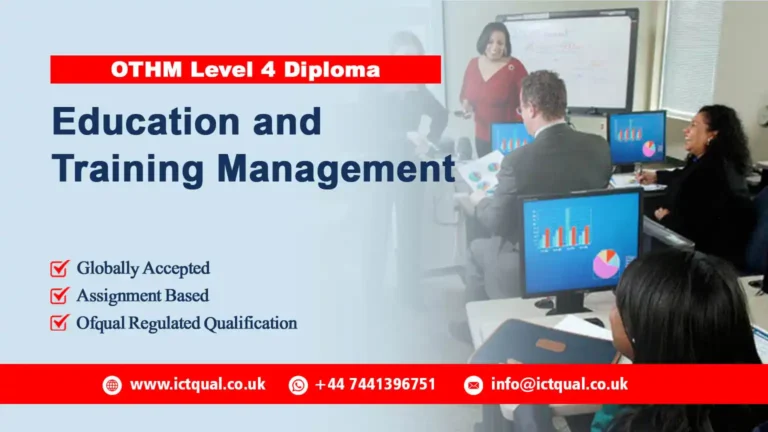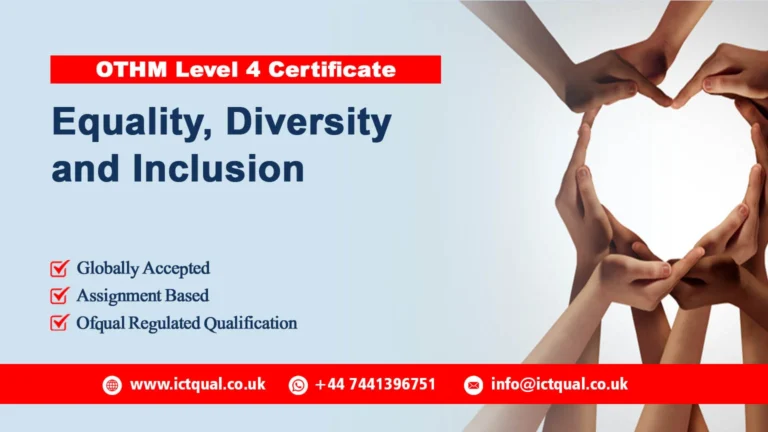In today’s competitive business landscape, understanding the human element is key to unlocking success. That’s where the OTHM Level 7 Diploma in Business and Organizational Psychology comes in—a transformative qualification that blends the principles of psychology with the dynamics of business to drive organizational excellence.
At its core, this diploma program delves into the intricate workings of the human mind within the organizational context. From exploring the psychology of leadership and motivation to understanding group dynamics and organizational behavior, participants gain a profound understanding of how human behavior influences workplace dynamics.
Organizational psychology isn’t just about theory—it’s about practical application. Through case studies, simulations, and real-world projects, participants learn to analyze complex organizational challenges and develop targeted interventions to enhance employee engagement, improve team dynamics, and foster a culture of innovation and productivity.
In today’s rapidly evolving business environment, adaptability is key. Graduates of the OTHM Level 7 Diploma in Business and Organizational Psychology are equipped to lead organizational change initiatives with confidence. Whether it’s implementing new processes, restructuring teams, or fostering a culture of continuous improvement, they have the knowledge and skills to drive meaningful change.
Are you ready to unlock the potential of psychology in business? Enroll in the OTHM Level 7 Diploma in Business and Organizational Psychology and embark on a journey of discovery and transformation. Join a community of forward-thinking professionals committed to driving positive change and building organizations where people thrive. Your journey to organizational excellence begins today.
The OTHM Level 7 Diploma in Business and Organizational Psychology is an advanced qualification designed to provide individuals with comprehensive knowledge and practical skills in the field of organizational psychology within a business context. This diploma program is tailored for professionals seeking to enhance their expertise in understanding human behavior, motivation, and performance in organizational settings.
Participants in this diploma program explore a wide range of topics, including organizational behavior, leadership, employee engagement, talent management, and organizational development. Through a rigorous curriculum, learners gain insights into psychological theories, principles, and techniques that are relevant to improving organizational effectiveness and performance.
The OTHM Level 7 Diploma in Business and Organizational Psychology equips participants with practical tools and strategies to analyze organizational challenges, develop interventions, and implement solutions that promote positive workplace outcomes. Graduates of this diploma program are well-equipped to drive organizational change, foster a positive work culture, and enhance employee well-being and productivity.
The OTHM Level 7 Diploma in Business and Organisational Psychology consists of 6 mandatory units for a combined total of 120 credits, 1200 hours Total Qualification Time (TQT) and 480 Guided Learning Hours (GLH) for the completed qualification.
| Sr# | Unit Title | Credit Hours |
|---|---|---|
| 1 | Health, Work and Stress | 20 |
| 2 | Motivation, Job design, and extrinsic rewards | 20 |
| 3 | Organisational development and change | 20 |
| 4 | Leadership and Management style | 20 |
| 5 | Team building | 20 |
| 6 | Research design in business psychology | 20 |
The OTHM Level 7 Diploma in Business and Organizational Psychology is designed for a diverse range of individuals who are passionate about understanding and improving the dynamics of human behavior within organizational settings. This course is particularly well-suited for:
- Human Resources Professionals: HR managers, specialists, and practitioners who aim to deepen their understanding of psychological principles in order to enhance employee engagement, performance, and well-being.
- Organizational Development Specialists: Professionals involved in organizational change management, talent development, and culture transformation, who seek to leverage psychological insights to drive positive organizational change.
- Leaders and Managers: Executives, managers, and team leaders who aspire to become more effective leaders by understanding the psychological factors that influence team dynamics, motivation, and performance.
- Consultants and Coaches: Business consultants, executive coaches, and leadership development specialists who want to incorporate psychological frameworks and interventions into their consulting and coaching practices to better support their clients.
- Entrepreneurs and Business Owners: Individuals starting or leading their own businesses who recognize the importance of understanding human behavior in creating successful and sustainable organizations.
- Graduates and Career Changers: Recent graduates or professionals from diverse backgrounds who are interested in transitioning into careers focused on organizational psychology, human resources, or leadership development.
Overall, this course is for anyone who is passionate about unlocking the potential of psychology in business and is committed to driving positive change within organizations to create thriving work environments.
Here are the learning outcomes for each of the study units:
Health, Work and Stress
- Understanding Health and Work Relationships: Gain insight into the complex interplay between health factors and work environments, including how job demands, resources, and organizational culture impact employee well-being.
- Stress Management: Develop strategies for identifying, managing, and reducing workplace stressors to promote employee health, resilience, and performance.
- Work-Life Balance: Explore techniques for fostering work-life balance and creating supportive work environments that prioritize employee health and well-being.
- Occupational Health and Safety: Understand the principles of occupational health and safety and their application in promoting a safe and healthy workplace for employees.
Motivation, Job Design, and Extrinsic Rewards
- Motivational Theories: Examine major motivational theories and models to understand the factors that drive employee motivation and engagement in the workplace.
- Job Design Principles: Learn how to design jobs and tasks that are challenging, meaningful, and aligned with employee skills and interests to enhance motivation and job satisfaction.
- Extrinsic Reward Systems: Explore the design and implementation of extrinsic reward systems, such as pay, benefits, and recognition programs, to incentivize employee performance and achievement.
- Performance Management: Develop skills in performance management techniques, including goal setting, feedback, and performance appraisal, to support employee motivation and development.
Organisational Development and Change
- Organisational Diagnosis: Learn how to assess organizational strengths, weaknesses, opportunities, and threats to identify areas for improvement and change.
- Change Management Models: Explore change management theories and frameworks to understand the process of planning, implementing, and evaluating organizational change initiatives.
- Stakeholder Engagement: Develop strategies for engaging stakeholders and managing resistance to change to facilitate successful organizational change efforts.
- Culture Transformation: Understand the role of organizational culture in driving change and learn techniques for fostering a culture of innovation, collaboration, and continuous improvement.
Leadership and Management Style
- Leadership Theories: Explore different leadership theories and styles, including transformational, transactional, and servant leadership, to understand their impact on organizational effectiveness and employee motivation.
- Management Styles: Examine various management styles and approaches, such as autocratic, democratic, and laissez-faire, and their implications for employee performance and satisfaction.
- Leadership Development: Develop skills in leadership development, including coaching, mentoring, and succession planning, to nurture future leaders and build leadership capacity within organizations.
- Ethical Leadership: Understand the importance of ethical leadership and learn how to lead with integrity, transparency, and accountability to inspire trust and ethical behavior in others.
Team Building
- Team Dynamics: Explore the dynamics of team formation, development, and functioning, including factors that contribute to effective teamwork and collaboration.
- Team Roles and Responsibilities: Understand the importance of defining roles, setting goals, and establishing norms within teams to optimize performance and achieve organizational objectives.
- Conflict Resolution: Develop skills in managing interpersonal conflicts and facilitating constructive conflict resolution within teams to maintain team cohesion and productivity.
- Virtual Team Leadership: Learn strategies for leading and managing virtual teams, including communication tools, technology platforms, and virtual team-building activities, to overcome geographical barriers and promote collaboration.
Research Design in Business Psychology
- Research Methodologies: Gain knowledge of different research methodologies, including quantitative, qualitative, and mixed methods approaches, and their application in business psychology research.
- Research Design: Develop skills in designing research studies, including formulating research questions, selecting appropriate research designs, and defining variables and measures.
- Data Collection Techniques: Learn how to collect data using various techniques, such as surveys, interviews, observations, and experiments, and ensure data validity and reliability.
- Data Analysis: Understand basic data analysis techniques, including descriptive and inferential statistics, and learn how to interpret research findings and draw meaningful conclusions.
Register Now
Fee Structure for OTHM Level 7 Diploma in Business and Organizational Psychology
Future Progression
The OTHM Level 7 Diploma in Business and Organizational Psychology offers learners the opportunity to advance their careers or pursue further education.
This qualification is endorsed and overseen by Ofqual (Office of the Qualifications and Examinations Regulation), providing learners with the possibility of advancing to Master’s top-up programs at numerous universities in the UK and abroad, often with advanced standing.







